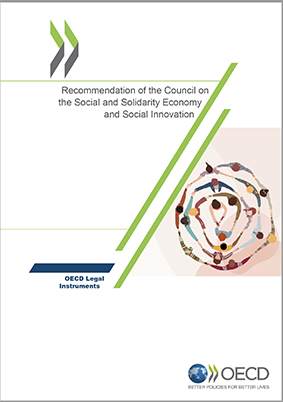The Recommendation on Social and Solidarity Economy and Social Innovation was adopted by the OECD Council at Ministerial level on 10 June 2022 on the proposal of the Local Employment and Economic Development Committee (LEED).
The Recommendation promotes the social economy’s potential to pioneer new business models, provide essential services, contribute to a fairer, green and digital transition, engage youth, and build communities. It recognizes the diversity of practice and the need for policy tools applicable to a range of country contexts and varying degrees of development of the social economy. The social economy is typically made up of organizations such as associations, cooperatives, foundations, mutual societies and social enterprises.
This Recommendation is timely given the prominent role of the social economy in addressing pressing challenges such as COVID-19 or supporting Ukrainian refugees and, looking ahead, in building long-term resilience.
The Recommendation is built around nine building blocks that provide the conditions for the social economy to thrive and help address challenges that affect, to a greater or lesser extent, social economy ecosystems at international, national and local level in any context. The nine building blocks capitalize on more than two decades of OECD work on the social economy and the guidance provided in OECD/EU Better Entrepreneurship Policy Tool, which is now being used to review social economy frameworks in OECD Member countries, EU Member states, and beyond.
The nine building blocks of the Recommendation are:
- Fostering a social economy culture
- Creating supportive institutional frameworks
- Designing enabling legal and regulatory frameworks
- Supporting access to finance
- Enabling access to public and private market
- Strengthening skills and business development support
- Encourage impact measurement and monitoring
- Supporting the production of data
- Encouraging social innovation
Next steps
The LEED DC will support the implementation of the Recommendation and report to Council in 2027.
In order to support Adherents’ implementation, the LEED DC is working on an implementation toolkit with detailed guidance on how to apply the nine building blocks underpinning the Recommendation, practical information as well as relevant good practice examples that Adherents could use as a resource in the design of their own policies.
In parallel, the OECD will continue to develop relevant country reviews, thematic work, and good practice reports as well as organise roundtables, workshops and conferences to monitor activities and emerging trends on the social economy and social innovation to ensure that the Recommendation remains relevant over time.
Read Recommendation of the OECD on the Social and Solidarity Economy and Social Innovation







